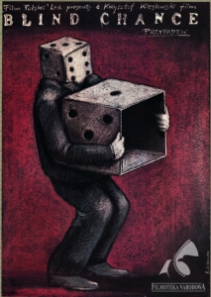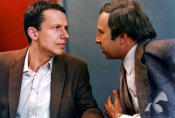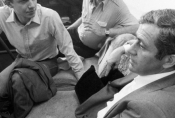BLIND CHANCE [1981]

year:
- 1981
release date:
- styczeń 1987
runtime:
- 112 min
directed by:
- Krzysztof Kieślowski
written by:
- Krzysztof Kieślowski
director of photography:
- Krzysztof Pakulski
cast:
- Bogusław Linda [Witek Długosz], Tadeusz Łomnicki [Werner, a communist], Zbigniew Zapasiewicz [Adam, a Party activist], Bogusława Pawelec [Czuszka], Marzena Trybała [Werka], Jacek Borkowski [Marek, an opposition activist], Jacek Sas-Uhrynowski [Daniel, Witek’s friend], Adam Ferency [Father Stefan], Monika Goździk [Olga Matwiszyn], Zygmunt Hübner [Dean], Irena Burawska [daughter of the dying woman], Irena Byrska [Witek’s aunt]
edited by:
- Elżbieta Kurkowska
music by:
- Wojciech Kilar
production design:
- Andrzej Rafał Waltenberger
produced by:
- Studio Filmowe „Tor”
executive producer:
- Jacek Szeligowski
awards:
-
• IFF Moscow (Soviet Union) 1987: Award of the Soviet Filmmakers Association
• Polish Feature Film Festival Gdynia 1987: award for the best screenplay for Krzysztof Kieślowski, award for the best male performance in a leading role for Bogusław Linda
About the film
A metaphorical parable of human fate comparing three types of commitment: communist, Christian and stoic.
Witek Długosz was born in Poznań in June 1956 during the workers’ strike in which his father participated. While Witek is studying in Łódź, his father dies. The boy decides to leave for Warsaw and goes to the train station...
On the train he meets Werner, a communist, who directs him to a Party official − Adam. The latter arranges a job for him in a youth organisation. Witek meets Czuszka, who is involved in underground publication activity. When he unwittingly causes the arrest of the girl, he breaks contact with Adam and does not go to France with the group of youth activists. The summer of 1980 approaches.
In another version of his life, Witek gets into a fight with a railway warden at the station. He is sentenced to a month of community service. He meets the oppositionists, Marek and Father Stefan, who introduce him to the underground activity. He works in a secret printing house which is compromised: but Witek refuses to cooperate with the Security Service.
In the third version, Witek is late for the train. Under the influence of Olga, he goes back to university, gets married, and has a son. Witek devotes himself to academic work, while remaining a passive observer of events in Poland. He is meant to go to Libya for a series of lectures, but at the last minute decides to take another flight to be with Olga, who is expecting the birth of their second child at any moment. Just after takeoff from Okęcie, the plane with Witek on board explodes in the air.
Jan Słodowski, Leksykon polskich filmów fabularnych, Warszawa 1996
Articles
-
Accidental Life Changes. Following Krzysztof Kieślowski
Jacek Bolewski
Świat według Kieślowskiego/The World According to Kieślowski, Editor: Barbara Kurowska, Publisher: Muzeum Kinematografii w Łodzi, 2011
-
Krzysztof Kieślowski: Je t’aime… Moi non plus
Grażyna Arata
Świat według Kieślowskiego/The World According to Kieślowski, Editor: Barbara Kurowska, Publisher: Muzeum Kinematografii w Łodzi, 2011








